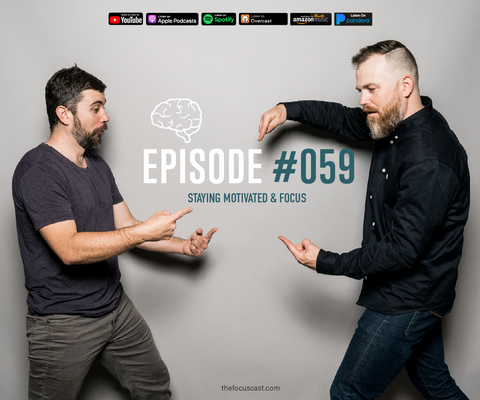
#59 Staying Motivated & Focus
Welcome to the FocusCast on this episode we’re talking about staying motivated. Bro, I see swaths of motivational videos all over the internet now. Everywhere I look there’s a new person doing crazy athletic shit, talking about hacking the mind, working 15 business at once. Is any of this shit real and how do we stay motivated in the real world and not on instagram fantasyland??? Well, hopefully I was motivated enough to make good notes so we can break this down so let's dig in...
00:00 Intro to staying motivated
01:02 Intro to podcast
01:30 Problem with staying motivated
02:15 What is motivated
05:22 Solutions to staying motived
PROBLEM:
- Hard work is fucking hard, so losing motivation and having to find it can be difficult. Especially if burnout is starting to kick in.
- First lets hit a definition of motivation as it relates to this episode the state or condition of being motivated or having a strong reason to act or accomplish something.
- The Neuroscience of motivation (Pubmed) All animals share motivation to obtain their basic needs, including food, water, sex and social interaction. Meeting these needs is a requirement for survival, but in all cases the goals must be met in appropriate quantities and at appropriate times. Therefore motivational drive must be modulated as a function of both internal states as well as external environmental conditions.
- The regulation of motivated behaviors is achieved by the coordinated action of molecules (peptides, hormones, neurotransmitters etc), acting within specific circuits that integrate multiple signals in order for complex decisions to be made.
SOLUTION:
- Huberman Lab #39 End goals and rewards are great however because of the way dopamine relates to our perception of time, working hard at something just for the sake of a reward can make hard work more challenging and less likely to start in the future.
- Experiment done at Stanford:
- Children in nursery school and kindergarten drew pictures simply because they liked to draw.
- The researchers took the kids who liked to draw for fun and began giving them rewards like gold stars for drawing.
- Then they stopped giving them the reward and the children had a much lower tendency to draw on their own., even though they enjoyed it without anyone telling them to do it before the rewards.
- Intrinsic vs extrinsic reinforcement
- When we receive rewards or give ourselves rewards, we tend to associate less pleasure with the activity that evoked the reward.
- When you only focus on the end/reward for effort you actually make it more painful and you’re less efficient. Dopamine makes effort easier and gives you energy.
- If you get a peak in dopamine from a reward, it’s going to lower your baseline dopamine (which kills motivation). Not only that but essentially wire your brain to dislike the activity more and only associate effort with rewards.
- Don’t spike dopamine immediately before or after intense effort.
- This makes you focus on the EFFORT itself. You must learn to access the rewards
FROM EFFORT
- You have to tell yourself the effort is great and pleasurable even if it sucks.
- Over time you can evoke dopamine release from this hard work or “friction”
- You ELIMINATE the ability to create these growth mindset brain circuits of finding pleasure from work if you only focus on the reward at the end.
- When shit is hard you tell yourself you’re doing it by choice and because you love it
- THE EFFORT IS THE FUCKING REWARD!!
FIND US ON
https://thefocuscast.com
https://www.instagram.com/thefocuscast
https://www.tiktok.com/@thefocuscast
#focus #dream #stayingmotivated

Comments (0)
There are no comments for this article. Be the first one to leave a message!